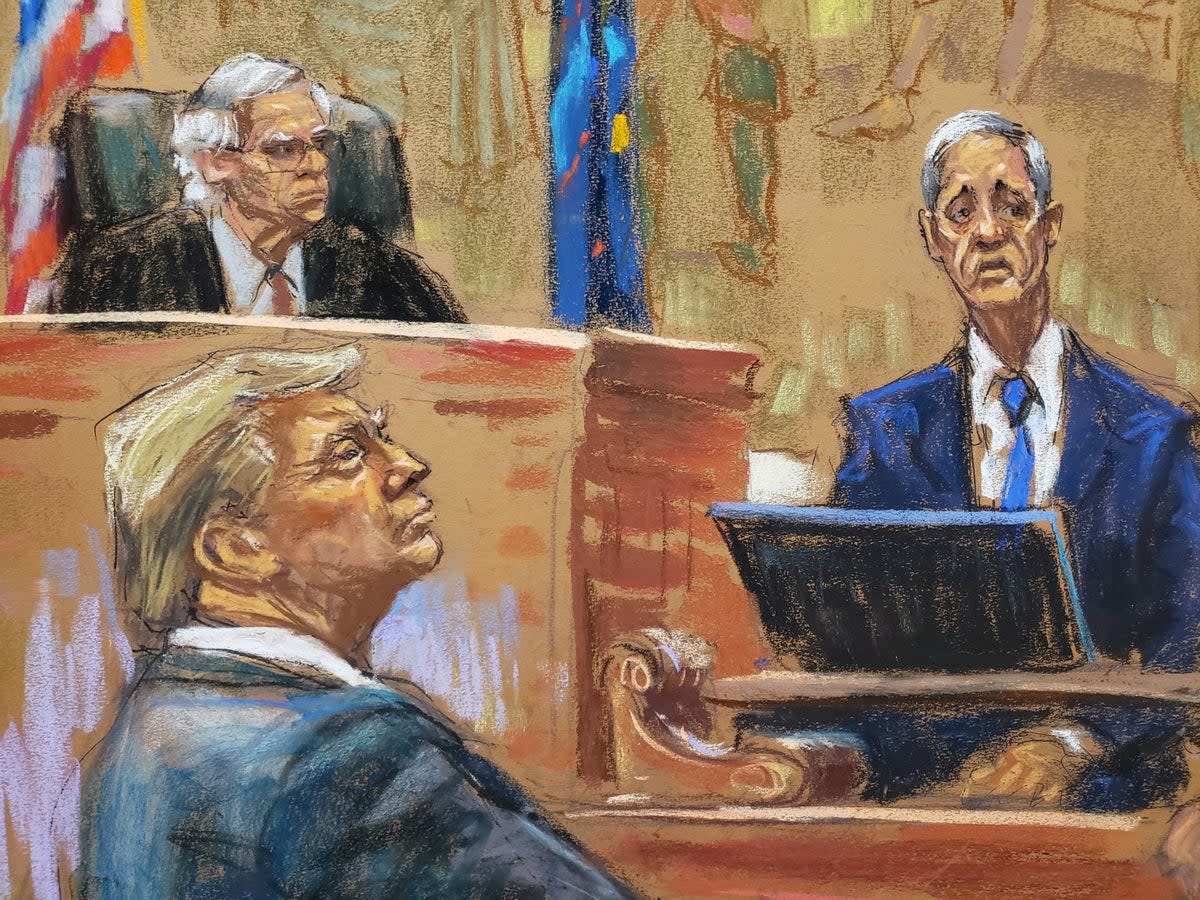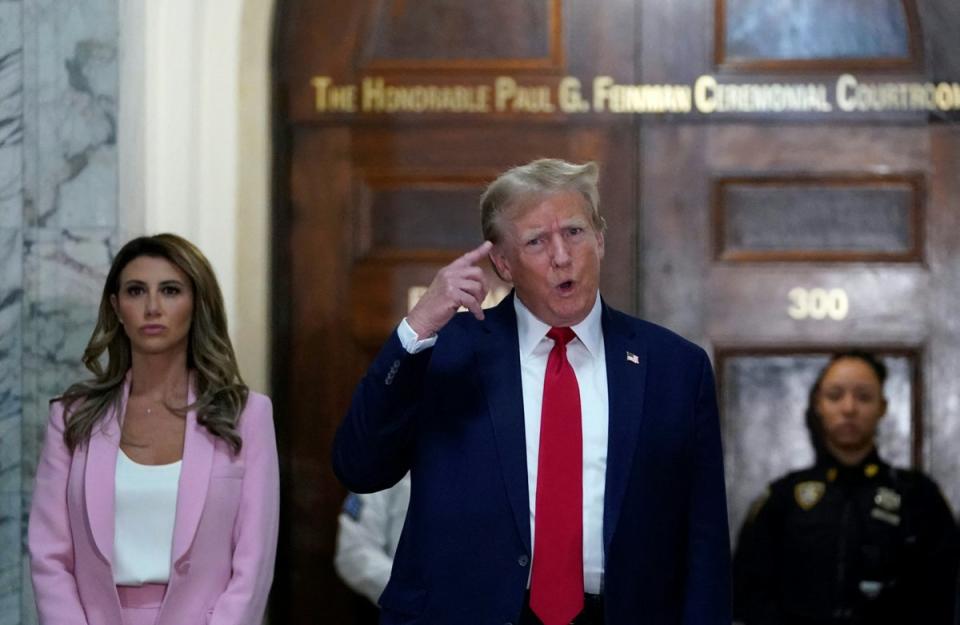Trump says he needs to lose weight after seeing courtroom sketch

There are only two defence witnesses left in Donald Trump’s fraud trial, and the former president is one of them.
He returned to New York County Supreme Court on Thursday for the first time in more than a month, but not as a witness. He sat with his attorneys inside Judge Arthur Engoron’s courtroom in lower Manhattan to watch testimony intended to bolster his defence – his first courtroom appearance since leaving his own chaotic day on the witness stand on 6 November.
After a morning break, Mr Trump paused to chat with two courtroom sketch artists seated behind the team of lawyers for New York Attorney General Letitia James, whose fraud lawsuit against the former president, his two oldest sons and their chief business associates launched a trial that is now in its 10th week.
The artists, hired by news organisations to capture the inside of the no-photos-allowed courtroom, got his approval. “Nice,” he said.
He told them “it looks like I need to lose some weight” as he gestured to his neck, they told The Independent.
The frontrunner for the 2024 Republican nomination for president has used the court as an extension of his campaign, where he can trash his political rivals and the judges and prosecutors overseeing the multiple criminal and civil cases against him.

He skipped Wednesday’s GOP presidential primary debate, and he didn’t schedule any counter-programming to draw attention to his campaign.
Instead, before walking through the heavy wooden doors of the courtroom on Thursday, he turned to the news cameras assembled there to hold another makeshift press conference to rage against the case, the judge overseeing his trial, and the attorney general suing him.
An email from his campaign on Thursday falsely claimed he was “forced into a courtroom in New York City to defend himself” from a trial he labelled a “witch hunt” and “election interference”. He is under no obligation to be there.
Inside the court, his attorneys introduced a second-to-last defence witness, Eli Bartov, a New York University accounting professor, who told the court that he went through the attorney general’s complaint “allegation by allegation” to “try to find at least something, some proof, that would provide some basis” for them. He claimed that any errors in accounting were “inadvertent.”
“Most of their claims were simply unsupported,” he said. “My main finding is that there is no evidence whatsoever of any accounting fraud.”
Mr Trump, who was broadly smeared the multiple criminal and civil cases against him as a Democratic conspiracy against him, appeared relatively relaxed and satisfied following Mr Bartov’s testimony, after the former president spent weeks dismissing the trial as bogus.
At one point, Mr Bartov – who was paid more than half a million dollars for his testimony – snapped at a lawyer for the attorney general after he suggested that Mr Barkov was being paid to say what Mr Trump’s team wanted.
“You make up allegations that never existed,” Mr Bartov said. “I’m here to tell the truth … Shame on yourself, talking to me like that.”
According to a transcript of his pretrial deposition from earlier this year, Mr Bartov said he was initially tapped as an expert witness to talk about “generally accepted accounting principles,” the guidelines for crafting statements of financial condition that are at the centre of the case.
He said he was “not really familiar” with those guidelines, and had been paid, at that time, roughly $520,000 from both the Trump Organization and his affiliated Save America PAC to participate.
“This is a highly respected man,” Mr Trump told reporters outside the courtroom. “I don’t know him, but he’s an expert witness, and he found no fraud whatsoever.”
Mr Bartov is among one of the only defence witnesses to explicitly say, in Trump-friendly terms, that the case should be thrown out, echoing some of Mr Trump’s own rhetoric, and making it apparent that the former president likely chose to attend his day of testimony in an effort to draw media to the courtroom to hear it.
The courtroom crowd was largely the same small group of reporters who have been covering the case.

Mr Trump is scheduled to return to the court on Monday, where he will be sworn in to testify a second and final time as his legal team wraps up its defence in a case that threatens his family business and its real estate empire.
The trial is expected to conclude next week. The judge is likely to issue a final judgment by the end of January.
Mr Trump’s appearance on Thursday also marked his first time in court since a gag order that blocks him from disparaging court staff was upheld by an appeals court, after court filings revealed the scale of death threats and abusive messages sent to Judge Engoron and his chief clerk following Mr Trump’s social media attacks.
His attorneys have tried to appeal to the state’s highest court, but a judge denied his attempt to fast-track those arguments, effectively ensuring that Mr Trump will remain under the gag order during his testimony on Monday and for any remaining business in the trial next week.
In a filing to a state appeals court on Wednesday, attorneys Judge Engoron warned that “the only potential harm” with overturning the gag order “is the risk of violence” against his staff.
“Any purported harm to Mr Trump’s (and his co-petitioners’) First Amendment rights is risible,” they wrote.
“Given the totality of the circumstances here, including the very real risk of harm to court staff, this Court should find that Justice Engoron exercised his discretion and authority in issuing the narrow gag orders and that such orders have not interfered with petitioners First Amendment rights.”
The lawsuit from Ms James accuses the defendants of defrauding financial institutions with grossly inflated estimates of his net worth and assets over a decade.
Judge Engoron has already found the defendants liable for fraud. A trial will determine what damages they could face, and whether the attorney general succeeds on other claims against the defendants, including insurance fraud and conspiracy.
The defence team introduced several expert witnesses over the last several weeks to testify about the Trump Organization’s business practices, including testimony to defend how Mr Trump created statements of financial condition provided to banks and lenders, and how the valuations of his properties in those documents were more like an artform, not a science.


